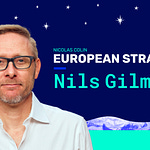The Agenda 👇
Global investor Chris Schroeder about startups in the Middle East and beyond
Today’s column in Sifted: would Stripe have succeeded without Silicon Valley?
A deep-dive into the future of consulting, inspired by the book (and movie) Moneyball
A curated list of all my past writings related to companies going public
A Q&A with a research firm about how governments are faring in the Entrepreneurial Age
This week I’m delighted to share a conversation I had with Chris Schroeder, an American entrepreneur, global investor and author of the book Startup Rising about the thriving entrepreneurial ecosystem in the Middle East. Chris and I met 2 years ago when I was visiting Washington, DC, where he lives, all thanks to my friend Ian Hathaway (co-author of The Startup Community Way with Brad Feld).
Chris, Ian, and I share a deep interest in entrepreneurship as a global phenomenon, specifically the fact that as technology becomes available across the globe, founders can succeed not only in Silicon Valley, but in every entrepreneurial ecosystem that’s emerging on the global map. Chris was led to write his book (whose first edition dates back to 2013) after attending a startup event in Dubai where his mind was blown by the sheer scale and passion of the startup community he encountered there.
His background was also a contributing factor, however. Before becoming an entrepreneur in the media industry and later focusing on investing in startups around the world, Chris worked as a staff member for then-Secretary of State James Baker, right when the world was undergoing the most radical transformation in our lifetime. He criss-crossed the world with his boss, practically witnessing the fall of the Berlin Wall, the collapse of the Soviet Union, the first Gulf War that the US waged against Iraq and Saddam Hussein’s brutal regime, and many other (incredible) things.
As he tells me in our conversation, Chris emerged from this experience with an unapologetic global outlook and a deep interest in what is happening in the rest of the world. It was only a matter of time before this interest converged with his passion for entrepreneurship, and now he’s one of the best experts and practitioners I know when it comes to knowing entrepreneurial ecosystems and working with founders based all over the world—a rather unusual positioning for an American.
I hope you like this podcast! If you want to dig deeper into Chris’s thoughts and works, check out his newsletter as well as his book, now in its second edition, Startup Rising: The Entrepreneurial Revolution Remaking the Middle East.
👉 Listen to my conversation with Chris using the player above or on Apple Podcasts or Spotify 🎧
The latest headline-grabbing fundraising round happened this week, with global payment company Stripe raising $600M in a round that values the business at $95B.
Founded by the Irish brothers Patrick and John Collison, Stripe is an example of a startup with European roots that has found success in the US and is now aiming directly at Europe as its second base (and key market). Those European roots have put a big question out there: Can a European startup follow a Stripe-like path to success, but without the (long) detour in the US?
👉 Read it all in Could a Stripe today succeed without Silicon Valley?
⚾️ Moneyball in Consulting Services
My Thursday deep dive last week looked at how an industry that has never enjoyed increasing returns to scale, namely consulting, could perhaps find new business models in the Entrepreneurial Age that would allow for those higher returns–even in the face of their clients’ desire to pay less while simultaneously demanding more of them than ever before.
Building and/or working at a successful consulting services firm was long one of the easiest ways to get rich, particularly during the latter half of the 20th century. Clients were willing to pay very high fees, fresh talent was continually knocking at the door, and since one of the services you were providing was plausible deniability for the client in case things went wrong, nobody was particularly upset if they did.
But now all of that has changed. Since 2008, clients aren’t willing to pay exorbitant fees anymore; talent has much better options for building an exciting career (not least in the startup world); and both clients and the public-at-large are starting to really hold consulting firms to account for both their advice and who they provide it to. So the question is looming larger and larger: Can the industry find new approaches that allow it to move from the market economy to doing capitalism?
👉 Read the details in Moneyball in Consulting Services (free for everyone!)
💸 All About Companies Going Public
On Friday, I curated an edition that is a critical part of developing startup ecosystems and successfully investing in tech companies: IPOs and other methods of taking a company public. The reason why it’s so important is because it directly relates to injecting liquidity into the system. Without companies going public, you can have a lot of value being generated, but that value won’t contribute much to increasing the velocity of money flowing within the system.
I started writing more frequently about this topic back in 2019, when the market for taking companies public was still stagnating and where the one big potential IPO–WeWork–turned into a catastrophe. Since, quite a bit has changed, as the IPO market loosened up, several key companies went public via direct listings, and the SPAC craze arrived as well.
No matter how it’s done, it’s clear that a critical step in the development of the European tech ecosystem will be finding ways to generate the liquidity that arrives by taking companies public. Doing so will provide a big boost in creating a self-sustaining virtuous circle, with founders, employees, and investors encouraged to utilize their gains to invest in the next generations of startups, and the public at large seeing that there is indeed a great deal of value being created and realized all around them.
👉 Dive into the journey in last week’s ‘Friday’s Digest’: All About Companies Going Public.
🏛 Government in the Entrepreneurial Age
I recently sat down for an interview regarding how governments are adapting to the digital age. It’s not necessarily an easy topic, as there can be a real disconnect between how governments frame their efforts and advances and how things are actually changing in the everyday lives of citizens and residents.
I saw that gap, for example, while living in the UK for five years. Although the UK is relatively strong at communicating regarding their desire to innovate via technology and digitize services throughout the country, the truth is that I still found myself often having to wait in line, or bring a printed document to a particular office, or wait for a password to be delivered by post, etc. And while many governments try to explain this away in the name of “privacy” (or even, in the case of a country such as France, “equality”), the end result for the user continues to be one that comes up very short and only inspires more mistrust in citizens who don’t believe the government can deliver what they really need.
So what would an advanced government look like, digitally speaking? In my eyes, it needs to fulfill three key demands that every individual now has with the arrival of the Entrepreneurial Age: being convenient, customizable, and responsive.
👉 Read the full Q&A in Government in the Entrepreneurial Age.
Sounds interesting? Subscribe to European Straits and let me know what you think!
📺 We at The Family are now hosting a weekly show, In Good Company—two directors at a time. I was a co-host in the latest two editions, where we were with Christoph Janz, a founder & partner of the seed VC firm Point Nine Capital, and then John Thornhill, the innovation editor at the Financial Times and cofounder of the pan-European startup outlet Sifted. You can watch the videos here:
In Good Company w/ Christoph Janz (hosts: my colleague Balthazar de Lavergne & me)
In Good Company w/ John Thornhill (hosts: my colleague Alice Zagury & me)
🇫🇷 Latest podcasts (in French) with my wife Laetitia Vitaud on our family media operation Nouveau Départ: Enfance : les transitions de la famille 🧒 Médias : la nouvelle génération 🗞 Productivité : pas de recette miracle 😵
🚀 My latest contribution to my firm The Family’s newsletter is about the critical difference between customers and clients—and why it matters for founders: It’s better to serve customers than clients.
From European Startups as an Asset Class (February 2020):
There is now a plurality of models when it comes to growing tech giants (Silicon Valley, China, Southeast Asia, the Middle East, soon Africa), and so there’s no reason why Europe can’t discover its own, different way. Another argument, echoing Christensen’s theory of disruptive innovation, is that Silicon Valley is doing so well that it’s bound to be disrupted by rising entrepreneurial ecosystems (and their happy investors) elsewhere in the world.
All recent editions:
Government in the Entrepreneurial Age—for subscribers only.
Moneyball in Consulting Services—for everyone.
All About Companies Going Public—for subscribers only.
Playing Video Games w/ Rachel Kowert. Consumption. Delivery. Profitability.—for everyone.
Funding Profitable Businesses—for subscribers only.
All About Delivery—for subscribers only.
The Future of Consumption—for subscribers only.
More About SPACs. The 'K-Shaped' Recovery. Crypto Digest. A Tribute to Texas.—for everyone.
(Credit: Franz Liszt, Angelus ! Prière Aux Anges Gardiens—extrait du disque Miroirs de Jonas Vitaud, NoMadMusic.)
European Straits is a 4-email-a-week product, and all essays are subscriber-only (with rare exceptions). Join us!
From Munich, Germany 🇩🇪
Nicolas





















Investing Across the World w/ Chris Schroeder. Stripe. Consulting. IPOs. Digital Government.